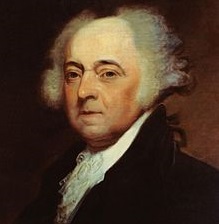 In 1774, as Britain and the American colonies verbally sparred over the issues of taxation, representation, and national identity, John Adams wrote a chronology of the conflict entitled Novanglus: A History of the Dispute with America from Its Origin to the Present Time. The future President of the United States realized that a corrupt people could never sustain a moral debate with King George III, much less a civilized society. Directing his comments specifically to his local context, Adams called upon the obvious source of rescue: he called upon pastors of his day to address the sins of both the state and individuals while simultaneously calling them to articulate a vision for public virtue.
In 1774, as Britain and the American colonies verbally sparred over the issues of taxation, representation, and national identity, John Adams wrote a chronology of the conflict entitled Novanglus: A History of the Dispute with America from Its Origin to the Present Time. The future President of the United States realized that a corrupt people could never sustain a moral debate with King George III, much less a civilized society. Directing his comments specifically to his local context, Adams called upon the obvious source of rescue: he called upon pastors of his day to address the sins of both the state and individuals while simultaneously calling them to articulate a vision for public virtue.
It is the duty of the clergy to accommodate their discourses to the times, to preach against such sins as are most prevalent, and recommend such virtues as are most wanted. For example,—if exorbitant ambition and venality are predominant, ought they not to warn their hearers against those vices? If public spirit is much wanted, should they not inculcate this great virtue? If the rights and duties of Christian magistrates and subjects are disputed, should they not explain them, show their nature, ends, limitations, and restrictions, how much soever it may move the gall of Massachusetts?
———————————————
Endnote
John Adams, “Novanglus: A History of the Dispute with America, from Its Origin in 1754, to the Present Time”; cited in Norman Cousins, ed., “In God We Trust”: The Religious Beliefs and Ideas of the American Founding Fathers (New York: Harper & Brothers, 1958), 89-90.